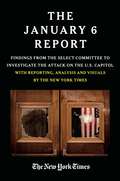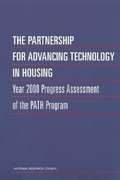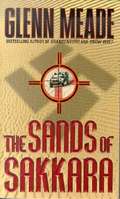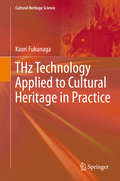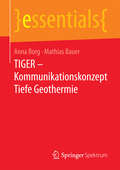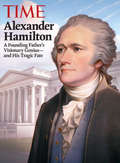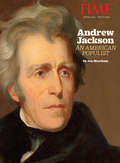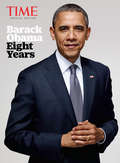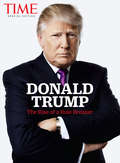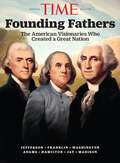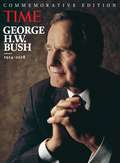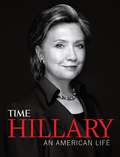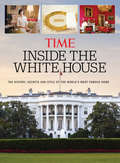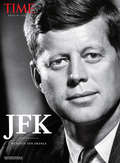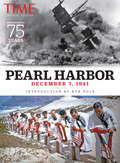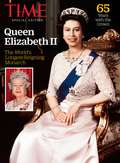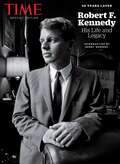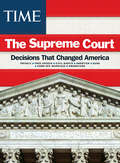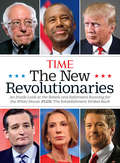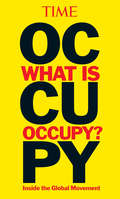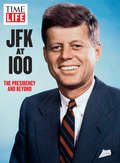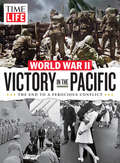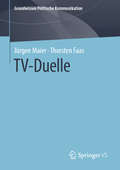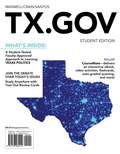- Table View
- List View
THE JANUARY 6 REPORT: Findings from the Select Committee to Investigate the Attack on the U.S. Capitol with Reporting, Analysis and Visuals by The New York Times
by The New York Times The January 6 Select CommitteeWith exclusive reporting, eyewitness accounts and analysis from the Pulitzer Prize-winning staff of The New York Times, this edition of THE JANUARY 6 REPORT offers the definitive record of the attack on the U.S. Capitol. Read the report from the select committee&’s investigation into the Jan. 6 attack on the Capitol, with accompanying insights from New York Times reporters who&’ve covered the story from the beginning. This edition from The New York Times and Twelve Books contains: • THE JANUARY 6 REPORT from the Select Committee • Reporting and analysis from The New York Times that puts the committee&’s findings in context • A timeline of key events • Photos and illustrations, including detailed maps that show the paths insurrectionists took to breach the Capitol • Interviews, transcripts and documents that complement the Committee&’s investigation • A list of key participants from the Jan. 6 hearings A critical examination of the facts and circumstances surrounding that dark day, THE JANUARY 6 REPORT promises to be the definitive account of what happened, with recommendations from the committee about how to safeguard the future of American democracy.
THE PARTNERSHIP FOR ADVANCING TECHNOLOGY IN HOUSING: Year 2000 Progress Assessment of the PATH Program
by Committee for Oversight Assessment of the Partnership for Advancing Technology in HousingThe National Academies Press (NAP)--publisher for the National Academies--publishes more than 200 books a year offering the most authoritative views, definitive information, and groundbreaking recommendations on a wide range of topics in science, engineering, and health. Our books are unique in that they are authored by the nation's leading experts in every scientific field.
THE SANDS OF SAKKARA
by Glenn MeadeThe Sands of Sakkara is a heart-pounding thriller set against the backdrop of wartime Egypt, where a breathless chase across the arid desert explodes, as two people race against time to stop a dark plot in the heart of World War II. Once Rachel Stern was a beautiful archaeologist, until the Nazis herded her behind barbed wire. Once Jack Halder lived between two nations. Now he is filled with rage, chosen to spearhead a desperate secret mission-and to bring Rachel Stern into it. Once Harry Weaver was one of America's best and brightest. Now he is the only U.S. agent who can hunt down the man who was his friend, and the woman they both loved in 1939. In a stunning story that reaches from the teeming streets of Berlin to the feet of the great pyramids, three former friends are about to meet again: around a mission to assassinate FDR.
THE SPY CHRONICLES RAW, ISI and the Illusion of Peace: Raw, Isi And The Illusion Of Peace
by A. S. Dulat Asad Durrani Aditya SinhaSOME TIME in 2016, a series of dialogues took place which set out to find a meeting ground, even if only an illusion, between A.S. Dulat and Asad Durrani. One was a former chief of RAW, India s external intelligence agency, the other of ISI, its Pakistani counterpart. As they could not meet in their home countries, the conversations, guided by journalist Aditya Sinha, took place in cities like Istanbul, Bangkok and Kathmandu. On the table were subjects that have long haunted South Asia, flashpoints that take lives regularly. It was in all ways a deep dive into the politics of the subcontinent, as seen through the eyes of two spymasters. Among the subjects: Kashmir, and a missed opportunity for peace; Hafiz Saeed and 26/11; Kulbhushan Jadhav; surgical strikes; the deal for Osama bin Laden; how the US and Russia feature in the India-Pakistan relationship; and how terror undermines the two countries attempts at talks. When the project was first mooted, General Durrani laughed and said nobody would believe it even if it was written as fiction. At a time of fraught relations, this unlikely dialogue between two former spy chiefs from opposite sides a project that is the first of its kind may well provide some answers.
THz Technology Applied to Cultural Heritage in Practice
by Kaori FukunagaThis book describes the current, concrete statusof terahertz (THz) technology applied to scientific diagnoses of culturalheritage objects for conservation planning as well as for historical interest. It is unlike other THz-related scientific books in optics series, which onlydescribe technologies and the physics behind them. A new method utilizing THztechnology is introduced, which will help conservators and historians to analyseart objects at their museums. By using pulse echoes, THz imaging cannoninvasively show internal structures such as layers in paintings and internaldefects or additional pieces in objects. The biggest advantage of THztechnology in heritage science is that THz waves can reveal the condition ofpreparation layers and supports of paintings that cannot be observed by othernondestructive testing methods, such as infrared (IR) or X-ray radiography. Thecondition of supports and preparation layers determine the lifetime of thepaintings, so that their condition is the key factor for conservation planning. The comparison with existing classic methods forscientific analyses is extremely important in the context of introducing newtechnologies in any research field, since most conservators and heritagescientists have their own protocols for classic methods. This book compares THzresults not only with visible cross sections obtained using destructivemethods, but also mid-IR, near IR, UV, X-ray, and nuclear magnetic resonance(NMR),which are considered to be nondestructive methods. The book suggests future work that can be done byTHz specialists, especially concerning the development of THz cameras, and byengineers and scientists in other fields, such as signal processing and chemistry,as well as by conservators.
TIGER – Kommunikationskonzept Tiefe Geothermie (essentials)
by Anna Borg Mathias Jürgen BauerDas vorliegende Kommunikationskonzept unterst#65533;tzt Investoren, Betreiber und Institutionen bei der #65533;ffentlichkeitsarbeit und Kommunikation f#65533;r den Bereich Tiefe Geothermie und zeigt Wege auf, die Akzeptanz f#65533;r das lokale Projekt zu f#65533;rdern. Es geht auf den Auftrag des durch das Bundesministerium f#65533;r Wirtschaft und Energie (BMWi) gef#65533;rderten Forschungsprojektes ,,TIGER - Tiefe Geothermie: Akzeptanz und Kommunikation einer innovativen Technologie" zur#65533;ck.
TIME Alexander Hamilton: A Founding Father's Visionary Genius and His Tragic Fate
by Editors of TIMELong considered the forgotten founding father and primarily known for the duel with Aaron Burr that ended his life, Alexander Hamilton has recently achieved a new level of fame because of the hit Broadway musical Hamilton, inspired by the New York Times best-selling biography by acclaimed historian Ron Chernow.Now the editors of TIME present this special edition that celebrates Hamilton and his many accomplishments: as one of the primary architects of the Constitution, an aide and counsel to General George Washington, and the first secretary of the Treasury, as well as his intense, long-standing rivalry with Thomas Jefferson and how it affects our government to this day. Also included in this fully illustrated edition are "Six Things You Didn't Know About Alexander Hamilton," an interview with Chernow, the making of the Broadway musical, why Hamilton's days on the $10 bill are numbered, and much more.TIME brings keen insight to the improbable life of the illegitimate son of a Caribbean merchant who would go on to help shape our nation, lay the foundation for the modern economy, and become the inspiration for a musical that is inspiring Americans to interpret history in an entirely new way.
TIME Andrew Jackson: An American Populist
by Jon Meacham The Editors of TIMEAndrew Jackson remains one of America's most extraordinary, influential and at times controversial leaders, defined by a brilliant military and political career that sought to advance the needs of the common man over those of the entrenched elite-in essence, giving rise to the idea of populism. This powerful TIME special edition, Andrew Jackson: An American Populist, examines the seventh president of the United States, his willful and combative style and his enduring legacy, and why it is so resonant today. Born of humble origins and orphaned as a child, Jackson became a lawyer, a brave and heroic general, and a United States senator before winning the presidency by besting John Quincy Adams, who had been born with great privilege. As a two-term president, Jackson distinguished himself with his skill at consensus-building as well as his quest to rout corruption out of the government. He could at times be woefully wrong: brutal in his treatment of American Indians and an unapologetic slave owner until his death. Yet as a gifted and strong-minded political tactician Jackson delivered significant legislative accomplishments, including keeping South Carolina in the union. After his presidency, Jackson retired to his plantation in Tennessee, the Hermitage, where he remained active in politics until he died. Jackson's life, actions and legacy are as important today as they were in his time. Through unmatched writing and storytelling as well as remarkable illustrations, Andrew Jackson: An American Populist delivers the full essence of the man.
TIME Barack Obama: Eight Years
by The Editors of TIMEIn his historic presidency, Barack Obama led the United States through eight tumultuous and remarkably active years. And in this definitive, one-of-kind Special Edition, TIME's experts assess the impact his administration had on the U.S. economy, foreign policy, health care and so much more. <P><P>Along with spectacular and often moving images, TIME's unmatched writers and reporters give this presidency a clear-eyed context through issues of race, inclusion and military approach.
TIME Donald Trump: The Rise of a Rule Breaker
by The Editors of TIMEWhether you love him or hate him, dismiss him or maintain a grudging respect, there's no denying that Donald Trump has up- ended this year's election season.Now, in this new Special Edition from the editors at TIME, you'll be able to go inside Donald Trump's world, from his early days in real estate development to his potentially historic race for the presidency.Donald Trump: The Rise of a Rule Breaker takes a balanced approach to the subject of all things Trump: from his outsider status in this year's presidential race to his complicated family life. You'll visit the Trumps at home, learn about the scandal surrounding Trump University and delve more deeply into "Things Called Trump," including apartment buildings, clothing, and casinos. Additionally, you'll look at Donald Trump's faith and his lighter side--which he does have. Additionally, readers will learn about the disaffected voters who are fueling his bid for the presidency.Donald Trump: The Rise of a Rule Breaker gives context to a compelling, complex and fascinating man.
TIME Founding Fathers
by The Editors of TIMECelebrate the American visionaries who created a great nation in the new special edition, TIME Founding Fathers.
TIME George H.W. Bush
by The Editors of TIMEWith determined grace and a steely dignity, George Herbert Walker Bush spent more than 40 years devoted to public service: First as a naval airman - he would be the last president to serve in World War II - and later as UN Ambassador, chairman of the Republican Party, head of the CIA, vice president under Ronald Reagan, and finally the 41st President of the United States. Bush would serve one term, leaving office in 1993. Yet he would never leave the American political landscape: as the father of the 43rd president, George W. Bush, and through continued commitment to volunteerism and philanthropy, he and his wife of 76 years, Barbara, remained in the public eye. Now, in this commemorative edition from TIME, an unmatched team of journalists and essayists, including Pulitzer Prize winners, and current and former correspondents, examine and honor the life and legacy of George H.W. Bush. He was known for many things, including his expert knowledge of foreign policy, and his "gentle touch" to world affairs during the end of the Cold War; his love of practical jokes as well as his appreciation for the personal, handwritten note, which became one of his hallmarks. Practical and driven to action, Bush's commitment to core values cemented the enduring friendships that he would keep with members of his cabinet as well as with the presidents who followed him. This remarkable keepsake edition traces Bush from his early upbringing to his final years, looking at his strengths and weaknesses as a leader and his dimensions as a person.
TIME Hillary: An American Life
by Editors of Time MagazineHillary Clinton embodies a world of "firsts": The first First Lady to have an active - and controversial role - in her husband's presidency, the first American First Lady to run for political office (and win it), the first female United States Senator from the state of New York, and certainly not last, nor the least, the most widely traveled Secretary of State in history. With reporting that only TIME magazine can bring to you, this book touches upon the high and low points of her life and career - from her time as First Lady, where she was often criticized for her active and assertive role in Bill Clinton's presidency, to her time in the United States Senate, her historic campaign for the nomination for president, and her decision to serve under the man who would defeat her - Barack Obama - as Secretary of State. This book will also help to dissect what the future might hold for Hillary, whether she chooses to run for office again or decides to remain a private citizen and devote her time to lecturing, teaching, and philanthropy.
TIME Inside the White House: The History, Secrets and Style of the World's Most Famous Home
by The Editors of TIME1600 Pennsylvania Avenue is perhaps the world's most famous address, and it is no ordinary home as it is the address of the White House, the official residence of the President of the United States. It is both global command center and family sanctuary, steeped in rich history and the world's most public private home. From the West Wing and the Oval Office, where most of the business of governing the country happens, to the East Wing, which has become the center of power for the First Lady, the White House is a world unto itself, situated on 18 acres, with over 100 rooms, thousands of staffers, its systems and infrastructure, and some of the most complicated and intense security in the entire world.Now, in an all-new Special Edition, TIME Inside the White House: The History, Secrets and Style of the World's Most Famous Home, readers go inside the White House in words and photos and learn of the rich history of America's House. The first presidential couple to inhabit the house in 1800 - John and Abigail Adams - moved into a home with only six inhabitable rooms. But over the years and based on presidential whims and desires, the changing times, and just as America has grown and evolved, so has the White House. Packed with diagrams, photographs and stories that chart the history of this symbolic house, TIME Inside the White House is an exclusive invitation to view this house like never before.
TIME JFK: His Enduring Legacy
by David Von Drehle The Editors of TIMEJohn F. Kennedy spent less than three years in the Oval Office, and it has been more than five decades since his assassination. Yet in public opinion polls, he is consistently rated one of the country's top presidents. <P><P>JFK entered the White House at a time of mounting global and domestic tensions and showed himself to be a decisive leader. He faced down the Russians. He tamed Big Steel. He inspired Americans with his oratory, promoting public service, civil rights and the belief that the United States could send a man to the moon. <P><P>JFK was the man for the moment. He ushered in the American Century and prepared the nation for its new role as a world superpower.
TIME Pearl Harbor: December 7, 1941
by Bob Dole The Editors of TIMETIME Magazine examines Pearl Harbor, 75 years later.
TIME Queen Elizabeth II: The World's Longest-reigning Monarch
by The Editors of TIMEQueen Elizabeth II is the longest-reigning British ruler and the longest-serving living monarch. Celebrate this record-breaking ruler in this commemorative edition from TIME.
TIME Robert F. Kennedy: His Life and Legacy 50 Years Later
by The Editors of TIMEHe was a man of seeming contradictions. Born to great wealth, Bobby Kennedy made common cause with the least fortunate. Initially viewed as ruthless over time he became deeply concerned with the plight of others — and he struggled to find realistic political solutions to their problems. He loved a crusade, and in his early years in public life, he opposed communism, corrupt labor-union leaders and organized crime. Later, he found larger, more complex targets to address: racism, poverty, institutional indifference. Most important, he challenged all of us to join him, not simply in imagining a better world for all, but in doing the difficult, everyday work of making those visions reality. Fifty years after Bobby Kennedy's assassination, celebrate his legacy with this special edition TIME Robert F. Kennedy.
TIME Supreme Court Decisions
by The Editors of TIMETIME Magazine examines important decisions by the Supreme Court.
TIME The New Revolutionaries: An Inside Look at the Rebels and Refomers Running for the White House
by Editors of TIMEThe editors of TIME present a guide to the presidential hopefuls that have surfaced for the 2016 election. These political outsiders are storming the capitol, and challenging the status quo of the Washington insiders. Highlights include:Q&A's with some of the most talked about candidates, including Donald Trump and Ben CarsonFrom Teddy Roosevelt to Ralph Nader, an overview of political outsiders throughout historyThe Establishment Fights Back: How Hillary Clinton, and other Washington veterans aren't handing over the keys just yet.
TIME What is Occupy?: Inside the Global Movement
by Editors of Time MagazineThe grassroots movement that started Sept. 17, 2011, with a protest in a park near Wall Street has mushroomed into a series of demonstrations in hundreds of cities around the world. In a year of protests from the Middle East to Madison, Wis., the Occupy uprising, a passionate outcry for economic justice, has been defined by its lack of definition. Now from TIME comes an illuminating collection of stories that answers many of the key questions about Occupy: How did it get started? What's behind the anger of the so-called 99% this group claims to represent? Who leads this leaderless movement? What should its agenda be? How can it transcend the occupation of tiny Zuccotti Park in lower Manhattan? What Is Occupy? includes chapters from the pages of TIME by columnists Joe Klein and Rana Foroohar, as well as new chapters original to the book, plus the results of exclusive TIME polls.
TIME-LIFE JFK at 100: The Presidency and Beyond
by The Editors of TIME-LIFEWar hero. Political icon. Martyr. As the 35th president of the United States, John F. Kennedy is one of the most celebrated figures in American history. Born into wealth and power, Kennedy proved himself to the nation as a young man, then rose through the ranks of elected office, reaching the White House at just 42 years old. It was the dawn of the nuclear age, and in his short term as president, JFK balanced a Cold War steeliness with a commitment to public service to assert America's role as a global leader. Alongside his wife, Jackie, and their two young children, JFK represented the new face of a new generation, and the hope and optimism he expressed continues to reverberate today.
TIME-LIFE Victory in the Pacific: The End to a Ferocious Conflict
by The Editors of TIME-LIFEAs 1945 progressed, Allied forces continued to move from island to island across the Pacific, closing in on the Japanese homeland. In Victory in the Pacific, youÍll find the winning strategies that lead to the Allies retaking Manila, invading Okinawa, attacking Iwo Jima and, finally, dropping the atomic bomb on Hiroshima and Nagasaki. The Japanese could fight no more. After six long years, World War II was truly over.
TV-Duelle (Grundwissen Politische Kommunikation)
by Thorsten Faas Jürgen MaierTV-Duelle sind ein fester Bestandteil und zugleich das wichtigste Einzelereignis in modernen Wahlkämpfen. Sie werden von Millionen von Zuschauerinnen und Zuschauern gesehen und umfassend in Massenmedien, aber zunehmend auch in den neuen Medien begleitet. Das vorliegende Buch gibt einen Überblick über Geschichte, Nutzung, Inhalte und Wirkungen von TV-Duellen. Im Fokus stehen dabei vor allem TV-Duelle in Deutschland. Der InhaltTV-Duelle in modernen Wahlkämpfen • Debattenforschung, aber wie? • Geschichte, Verbreitung und Varianten von TV-Duellen • Debatteninhalte und Debattenstrategien • Nutzung von TV-Duellen: Umfang, Rezipientenmerkmale und -motive • Wahrnehmung von TV-Duellen und Wahrnehmung des Debattensiegers • Wirkung von TV-Duellen • Kommunikation über TV-Duelle • Was gibt es nach 60 Jahren Debattenforschung noch zu untersuchen?Die AutorenProf. Dr. Jürgen Maier ist Professor für Politische Kommunikation an der Universität Koblenz-Landau. Seine aktuellen Arbeitsschwerpunkte liegen in den Bereichen Politische Kommunikation, Wahlen und politische Einstellungen sowie Einsatz experimenteller Designs bei der Untersuchung sozialwissenschaftlicher Fragestellungen.Prof. Dr. Thorsten Faas leitet die Arbeitsstelle "Politische Soziologie der Bundesrepublik Deutschland" am Otto-Suhr-Institut für Politikwissenschaft an der Freien Universität Berlin. Seine Arbeitsschwerpunkte liegen im Bereich von Wahlen, Wahlkämpfen und Wahlstudien.
TX.GOV
by William Earl Maxwell Ernest Crain Adolfo SantosTX.GOV employs a motivating debate theme and focuses on the current and historical conflicts and controversies that define Texas politics. This will prepare you to speak intelligently about your state, understand today's issues, and join in the discussions around you.
